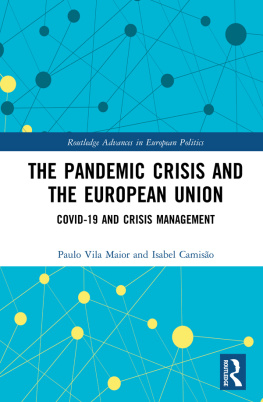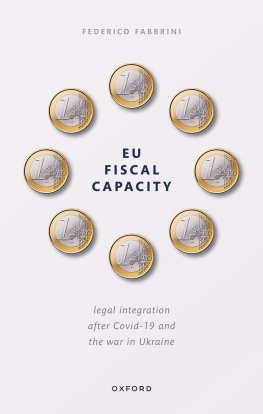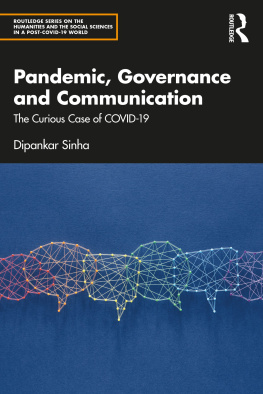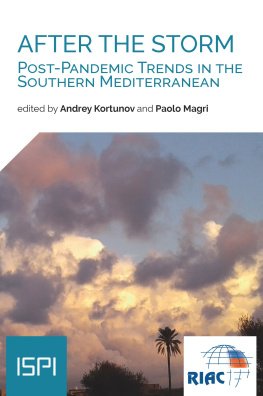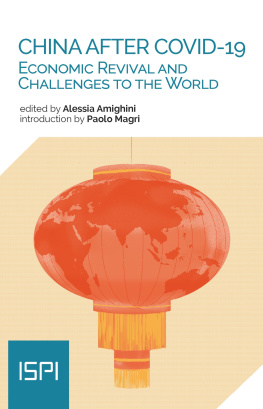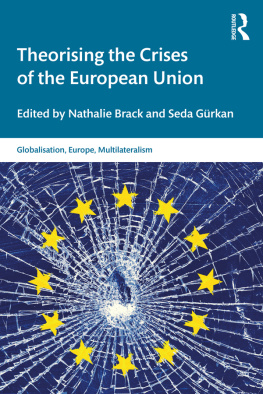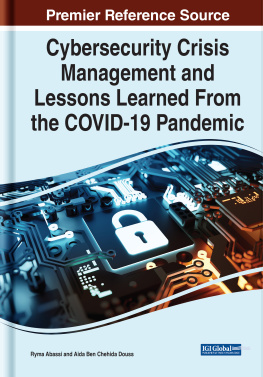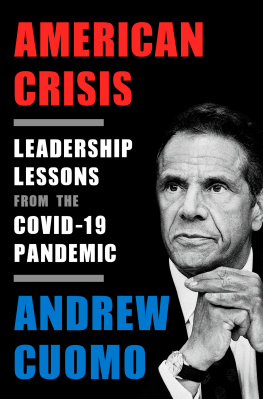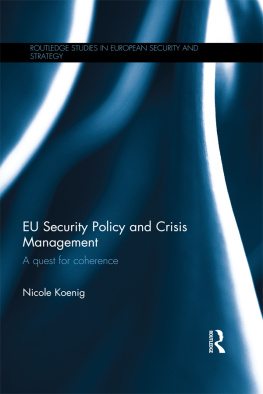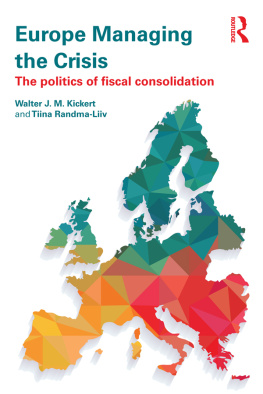The Pandemic Crisis and the European Union
This book assesses the implications of the COVID-19 pandemic for the European Union (EU), as well as its response in dealing with an overarching, multidimensional crisis with consequences extending beyond public health safety to political, economic, legal and institutional arenas.
It argues the pandemic represents a symmetric crisis cutting across countries with different social, economic and political characteristics and which yet despite favouring cooperative solutions at the supranational level has largely been met with initial responses of a national, even local, nature. So, how well did the EU perform as a crisis manager in the pandemic crisis?
This book will be of key interest to scholars, students and readers of crisis, pandemic and health management, European Union politics and governance.
Paulo Vila Maior is Associate Professor of European Studies at the University Fernando Pessoa and Researcher at CEPESE, Porto, Portugal.
Isabel Camiso is Assistant Professor in European Studies at the University of Coimbra, and Researcher at CICP, Braga and vora, Portugal.
Routledge Advances in European Politics
Changing Perceptions of the EU at Times of Brexit
Global perspectives
Edited by Natalia Chaban, Arne Niemann and Johanna Speyer
The EU through Multiple Crises
Representation and cohesion dilemmas for a sui generis polity
Edited by Maurizio Cotta and Pierangelo Isernia
Linguistic Claims and Political Conflicts
Spanish labyrinths in the European Context
Andrea C. Bianculli, Jacint Jordana and Mnica Ferrn Pereira
EUKorea Security Relations
Edited by Nicola Casarini
European Futures
Challenges and crossroads for the European Union of 2050
Edited by Chad Damro, Elke Heins and Drew Scott
Poland and Germany in the European Union
The multi-dimensional dynamics of bilateral relations
Edited by Elbieta Opiowska and Monika Sus
Electoral Politics in Crisis After the Great Recession
Change, fluctuations and stability in Iceland
Eva H. nnudttir, Agnar Freyr Helgason, Olafur Th. Hardarson and Hulda Thrisdttir
The Pandemic Crisis and the European Union
COVID-19 and crisis management
Paulo Vila Maior and Isabel Camiso
For more information about this series, please visit: www.routledge.com/Routledge-Advances-in-European-Politics/book-series/AEP
The Pandemic Crisis and the European Union
COVID-19 and Crisis Management
Paulo Vila Maior and Isabel Camiso

First published 2022
by Routledge
2 Park Square, Milton Park, Abingdon, Oxon OX14 4RN
and by Routledge
605 Third Avenue, New York, NY 10158
Routledge is an imprint of the Taylor & Francis Group, an informa business
2022 Paulo Vila Maior and Isabel Camiso
The right of Paulo Vila Maior and Isabel Camiso to be identified as authors of this work has been asserted b y them in accordance with sections 77 and 78 of the Copyright, Designs and Patents Act 1988.
All rights reserved. No part of this book may be reprinted or reproduced or utilised in any form or by any electronic, mechanical, or other means, now known or hereafter invented, including photocopying and recording, or in any information storage or retrieval system, without permission in writing from the publishers.
Trademark notice: Product or corporate names may be trademarks or registered trademarks, and are used only for identification and explanation without intent to infringe.
British Library Cataloguing-in-Publication Data
A catalogue record for this book is available from the British Library
Library of Congress Cataloging-in-Publication Data
Names: Vila Maior, Paulo, author. | Camisao, Isabel, author.
Title: The pandemic crisis and the European Union: COVID-19 and crisismanagement / Paulo Vila Maior and Isabel Camisao.
Description: Abingdon, Oxon; New York, NY: Routledge, 2022. |Series: Routledge advances in European politics |Includes bibliographical references and index.
Identifiers: LCCN 2021022403 (print) | LCCN 2021022404 (ebook) |ISBN 9780367722081 (hardback) | ISBN 9780367722135 (paperback) |ISBN 9781003153900 (ebook)
Subjects: LCSH: Public healthEuropean Union countries. |Medical policyEuropean Union countries. |COVID-19 (Disease)Economic aspects. | COVID-19 (Disease)Social aspects.
Classification: LCC RA483 .V55 2022 (print) | LCC RA483 (ebook) |DDC 362.1962/4140094dc23
LC record available at https://lccn.loc.gov/2021022403
LC ebook record available at https://lccn.loc.gov/2021022404
ISBN: 978-0-367-72208-1 (hbk)
ISBN: 978-0-367-72213-5 (pbk)
ISBN: 978-1-003-15390-0 (ebk)
DOI: 10.4324/9781003153900
Typeset in Times New Roman
by Newgen Publishing UK
Contents
Illustrations
Figures
Tables
Acknowledgements
This study was conducted at Research Center in Political Science (UID/CPO/0758/2019), University of Minho/University of vora and supported by the Portuguese Foundation for Science and Technology and the Portuguese Ministry of Education and Science through national funds.
Abbreviations
CAACrisis Coordination ArrangementsCEASCommon European Asylum SystemCRIICorona Response Investment InitiativeCRTCorona Response TeamECBEuropean Central BankECDCEuropean Centre for Disease Prevention and ControlECJEuropean Court of JusticeECSCEuropean Coal and Steel CommunityEECEuropean Economic CommunityEESEntry/Exit SystemEMAEuropean Medicines AgencyEMUEconomic and Monetary UnionEPEuropean ParliamentEPSCOEmployment, Social Policy, Health and Consumer AffairsERCCEmergency Response Coordination CentreETIASEuropean Traveller Information and Authorisation SystemEUEuropean UnionEWRSEarly Warning and Response SystemGDPGross Domestic ProductHERAHealth Emergency Response AuthorityHSCHeath Security CommitteeIPCRIntegrated Political Crisis ResponseIRInternational RelationsJPAJoint Procurement AgreementMFFMultiannual Financial FrameworkOMTOutright Monetary TransactionsPEPPPandemic Emergency Purchase ProgrammePPEPersonal Protective EquipmentREACT-EURecovery Assistance for Cohesion and the Territories of EuropeSARSSevere Acute Respiratory SyndromeSBCSchengen Borders CodeSGPStability and Growth PactSISSchengen Information SystemTEUTreaty on the European UnionTFEUTreaty on the Functioning of the European UnionUSUnited StatesWHOWorld Health Organisation
Introduction COVID-19 and the European Union is this time really for bad?
DOI: 10.4324/9781003153900-1
I.1Introduction
On 24 January 2020 the first case of COVID-19 was reported within the European Union (EU). At that time, Europe, and the rest of the world, were far from anticipating the true dimension of the crisis that was forming. COVID-19 pandemic is a transversal crisis, cutting across countries with different social, economic and political characteristics, wealthier and developing countries all together. For its highly contagious potential, COVID-19 forced authorities around the globe to enforce legal measures that implemented lockdown to variable degrees, which eventually paralysed a large part of member states economic activities. At some point, the world was forcefully brought to a halt. Companies were shut down, bringing massive amounts of workers to layoff or to unemployment. Production and consumption hit historical lows. As households income decreased, the economy further slowed down, paving the way for deep worldwide recession.

